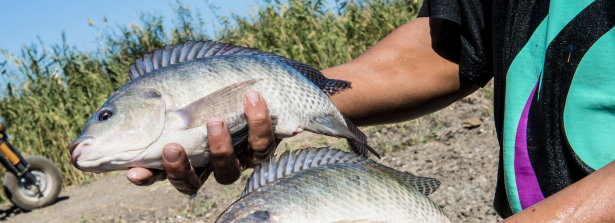Accelerating aquaculture development – Ghana

Duration: February 18, 2019 – February 17, 2022
Project information
Full title: Accelerating aquaculture development in Ghana through sustainable Nile Tilapia seed production and dissemination
Objective: This project aims to build on the successes in Ghana’s tilapia cage culture and to accelerate tilapia development through testing interventions to improve the seed system for small-scale cage and pond farmers.
Abstract: This proposal aims to build on the successes in Ghana’s tilapia cage culture, and accelerate tilapia development through testing interventions to improve the seed system for small-scale cage and pond farmers, by addressing the research question “How can the production and marketing of high quality tilapia seed be developed in a sustainable and commercially viable manner?” This is done by addressing two objectives:
- to improve the quality and service level of public and private hatcheries, and
- to increase access to and use of high-quality fish seed for new or existing producers, with specific attention for women and youth (age=15-35).
Research will initially focus on exploratory research including gender-sensitive seed supply chain assessment; ex ante feasibility studies and ex post assessment of business models for seed production and distribution; and examining farmers’ demand for quality fingerlings for tilapia culture (both pond and cage), farmers’ willingness to pay for quality fingerlings, and the needs for capacity development among hatcheries and farmers. Partly parallel to this process the research team will start testing business and extension models, and quality assurance mechanisms to be implemented in the tilapia seed sector to accelerate access to and adoption of quality fingerlings and good aquaculture practices.
Research will involve±
- action research, which involves stakeholder engagement in the research and documentation of practices and processes to provide practical advice to implementers both at private and public sectors, and
- assessment and impact evaluation, using both quantitative and qualitative methods. Finally, these research outputs will be linked to a capacity development strategy and knowledge sharing and dissemination strategy.
_ _ _
This project received funds in the Call on “Seed Systems Development (SSD): Enabling and Scaling Genetic Improvement and Propagation Materials” which was released by NWO-WOTRO within the framework of the Netherlands-CGIAR research partnership. The nine awarded project consortia consist of Dutch research institutes, CGIAR Research Programs or platforms, and (Dutch or local) partners from the public and private sector.
